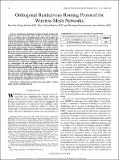| dc.contributor.author | Cheng, Bow-Nan | |
| dc.contributor.author | Yuksel, Murat | |
| dc.contributor.author | Kalyanaraman, Shivkumar | |
| dc.date.accessioned | 2010-03-05T16:06:45Z | |
| dc.date.available | 2010-03-05T16:06:45Z | |
| dc.date.issued | 2009-04 | |
| dc.date.submitted | 2007-06 | |
| dc.identifier.issn | 1063-6692 | |
| dc.identifier.uri | http://hdl.handle.net/1721.1/52338 | |
| dc.description.abstract | Routing in multi-hop wireless networks involves the indirection from a persistent name (or ID) to a locator. Concepts such as coordinate space embedding help reduce the number and dynamism complexity of bindings and state needed for this indirection. Routing protocols which do not use such concepts often tend to flood packets during route discovery or dissemination, and hence have limited scalability. In this paper, we introduce Orthogonal Rendezvous Routing Protocol (ORRP) for meshed wireless networks. ORRP is a lightweight-but-scalable routing protocol utilizing directional communications (such as directional antennas or free-space-optical transceivers) to relax information requirements such as coordinate space embedding and node localization. The ORRP source and ORRP destination send route discovery and route dissemination packets respectively in locally-chosen orthogonal directions. Connectivity happens when these paths intersect (i.e., rendezvous). We show that ORRP achieves connectivity with high probability even in sparse networks with voids. ORRP scales well without imposing DHT-like graph structures (eg: trees, rings, torus etc). The total state information required is O(N3/2) for N-node networks, and the state is uniformly distributed. ORRP does not resort to flooding either in route discovery or dissemination. The price paid by ORRP is suboptimality in terms of path stretch compared to the shortest path; however we characterize the average penalty and find that it is not severe. | en |
| dc.description.sponsorship | National Science Foundation (Grant IGERT 0333314, Grant ITR 0313095, Grant STI 0230787, Grant 0721542, Grant 0627039) | en |
| dc.language.iso | en_US | |
| dc.publisher | Institute of Electrical and Electronics Engineers and Association for Computing Machinery | en |
| dc.relation.isversionof | http://dx.doi.org/10.1109/TNET.2008.926511 | en |
| dc.rights | Article is made available in accordance with the publisher’s policy and may be subject to US copyright law. Please refer to the publisher’s site for terms of use. | en |
| dc.source | IEEE | en |
| dc.subject | wireless routing protocol | en |
| dc.subject | free-space-optics | en |
| dc.subject | free-space-optics | en |
| dc.subject | directional antennas | en |
| dc.title | Orthogonal Rendezvous Routing Protocol for Wireless Mesh Networks | en |
| dc.type | Article | en |
| dc.identifier.citation | Bow-Nan Cheng, M. Yuksel, and S. Kalyanaraman. “Orthogonal Rendezvous Routing Protocol for Wireless Mesh Networks.” Networking, IEEE/ACM Transactions on 17.2 (2009): 542-555. © 2009 Institute of Electrical and Electronics Engineers | en |
| dc.contributor.department | Lincoln Laboratory | en_US |
| dc.contributor.approver | Cheng, Bow-Nan | |
| dc.contributor.mitauthor | Cheng, Bow-Nan | |
| dc.relation.journal | IEEE/ACM Transactions on Networking | en |
| dc.eprint.version | Final published version | en |
| dc.type.uri | http://purl.org/eprint/type/JournalArticle | en |
| eprint.status | http://purl.org/eprint/status/PeerReviewed | en |
| dspace.orderedauthors | Bow-Nan Cheng; Yuksel, M.; Kalyanaraman, S. | en |
| mit.license | PUBLISHER_POLICY | en |
| mit.metadata.status | Complete | |
